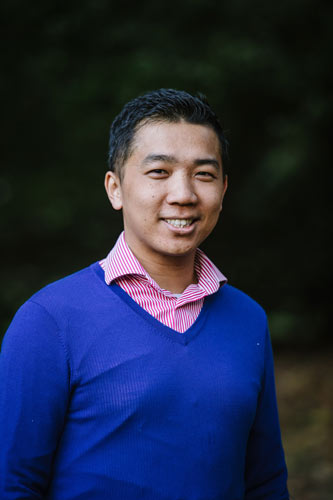Garry Sien: Tech leader and global citizen
BSc graduate Garry Sien has gone from majoring in computer science to being a leader in the tech space, with extensive experience in the Asia Pacific. Currently based in Hong Kong as a Principal Advisory Consultant for Alibaba Cloud, Garry doesn’t let distance get in the way of giving back as a STEM Industry Mentor.
 Global citizenship
Global citizenship
Being a global citizen doesn’t necessarily mean you speak multiple languages - it means you have the ability to empathise with and understand different cultures. Most importantly, it means being able to appreciate differences so you can find the best way to work with people across locations.
Advancement in technology has meant that working with global teams is now the norm and not the exception, especially in the tech industry.
At the end of the day, technology is a people business. The value of technology is not just in building the best tools. Rather, it's about the application of technology to help solve problems.
After graduating, I went on to work for ANZ in Australia and the Asia Pacific in an array of business and technology-focused roles. I feel very proud of helping ANZ build its presence in Asia. I’ve also been involved in the acquisition of RBS' selective Asia business (the biggest bank in terms of assets at the time) and divestment projects, running a technology team in Shanghai, moving into an internet company, and directly supporting the government sector through their digital transformation.
I have recently moved to Hong Kong and am working for Alibaba, focusing on product and fintech innovation across various sectors, including financial services and smart cities and government.
These experiences have all been very interesting, to say the least!
The value of mentoring
It's important to me to give back to the University of Melbourne because it helped to kickstart my career. I'm proud to be a University of Melbourne alum. We all want this great institution to keep making its mark on the global stage.
One thing I really appreciated about my time at the University of Melbourne was the diversity, with a great mix of local and international students and exposure to different cultures (especially during my time as the president for the Hong Kong Students' Association).
Back when I was studying, I wished that I had access to mentors. It's something I want to help with so that these mentees will become next-generation mentors, and keep this great practice going.
I didn't know if remote mentoring would work at the start, but I'm very glad to have taken the step forward. I believe mentees appreciate a more international perspective, too.
As a mentor, you are given the opportunity to share knowledge that may help mentees avoid making the same mistakes that we did. At the same time, you get to learn about the challenges that the current students are experiencing.
I recently spoke with a mentee through the ‘Ask Alumni’ program and shared a few thoughts on career development. He started university exactly 20 years after me, so I was a little worried that my advice would not be relevant.
And how wrong was I?
I reminded him that it's not just about creating the software, it's about the application of technology so that it is useful and creates value for society. I shared my belief that it's an exciting period to be a professional that can both create and make good use of technology.
We are only at the beginning of the ‘digital economy era’, which just got fast-tracked by the COVID-19 situation.
All my mentee needed was a sounding board and a few words of assurance that the technology profession was a good choice (especially when he actually enjoys software development!)
It was just 20 minutes, but the impact it had on both of us reinforced for me the value of mentorship.
Skills for the future
Often mentees ask about the skills needed to secure a good job. I answer by saying that it's almost impossible to predict the changes and disruptions that may impact the skills needed for the future. My advice centres around what they are passionate about, and on soft skills, which will always stand the test of time.
As for technical skills, I'm of the belief that, given the rapid improvement and advancement of technology, we need to remain flexible and pursue lifelong learning.
Connect with Garry Sien and join the Science Alumni group on LinkedIn.